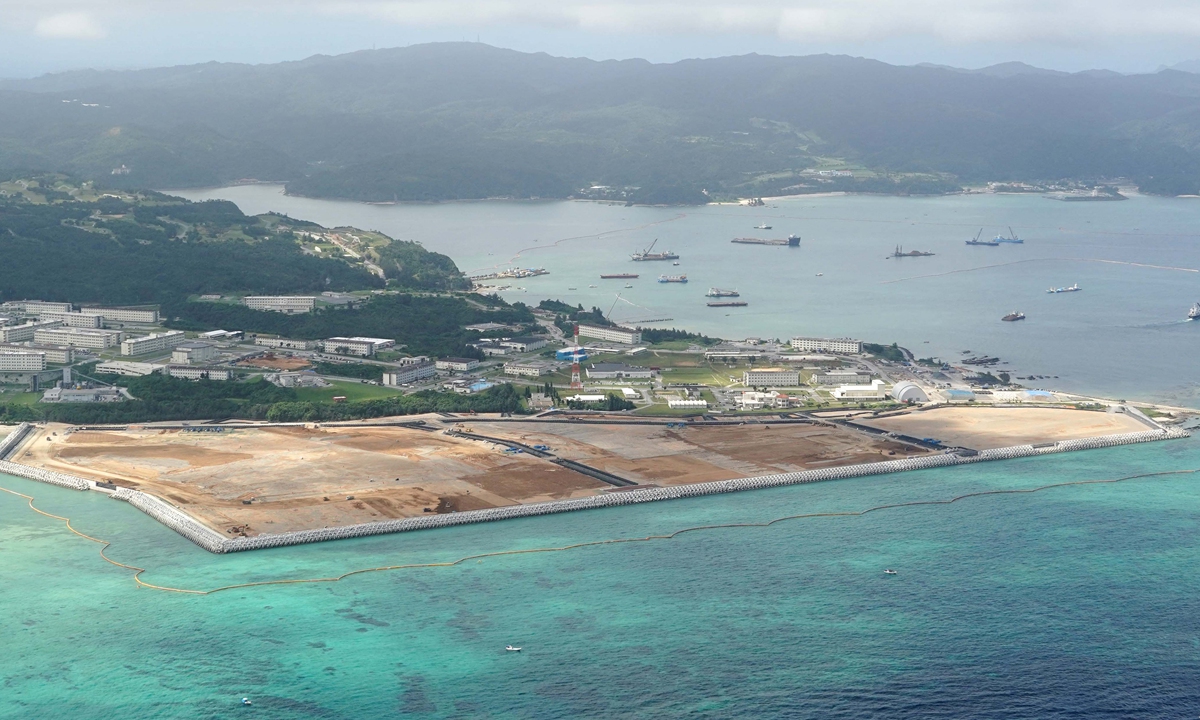
Landfill site for US air base in Okinawa. Photo: AFP
The Wall Street Journal (WSJ), citing US officials, reported that classified US intelligence reports suggest China intend to establish its permanent military presence in the Atlantic Ocean in the tiny Central African country of Equatorial Guinea. A source said it will enable China to get gas and groceries and to rearm and repair naval vessels. An official told WSJ that Washington has "made clear to Equatorial Guinea that certain potential steps involving [Chinese] activity there would raise national security concerns."China has not provided relevant information, nor has Equatorial Guinea confirmed what the US said. It is known that in Equatorial Guinea's Atlantic-facing port city of Bata, China has invested and built a deep-water commercial port, with which Gabon and the Central African Republic are connected by highways. As African countries are actively participating in the China-proposed Belt and Road Initiative, these practices seem quite normal.
Does China need to have a permanent naval base on the west coast of Africa? This is an interesting question. We certainly cannot see any reason for China to accelerate its military projection to the Atlantic in a bid to carry out a strategic great power game. That is inconceivable. But China has made huge investments in Africa and also intends to deter and combat piracy. If China were to establish a naval supply station for this end, it would be different from what the US has imagined. It will benefit the region without any harm.
The key area for the US to defend against China is the Indo-Pacific. China's biggest challenge to safeguard its core interests also comes from that region. The US has directed China's ambition of projecting its military power to the Atlantic. This kind of geopolitical leap is quite large, and it is believed that many people's mentality cannot catch up with it.
But this is only part of the problem. It is one thing whether China has consulted with countries about its military bases. It is quite another for the US not only to pay attention to such moves, but also to prevent any country from approving China's building of military facilities.
We have noticed that the WSJ report shows that the US has coerced Equatorial Guinea and conveyed a tough message to the country, warning that it is "shortsighted" to "insert itself between the frontlines of US-China global competition." Furthermore, public information shows that the US has been accusing the family of Equatorial Guinea's president of "overseas corruption" and criticized the country for numerous "human rights" crimes. At the same time, the US displayed its intent to rope in the country.
Meantime, the UAE has also been eyed by the US. US media reported that US intelligence agencies found evidence of construction work inside a container terminal built and operated by Chinese shipping corporation COSCO at a port in UAE which was alleged to be a secret Chinese military facility. The Biden administration ratcheted up diplomatic efforts, propelling the UAE to declare that it "has never had an agreement plan, talks or intent to host a Chinese military base or outpost of any kind." The US sent a message that if UAE were to provide military assistance to China, a $23 billion weapons sales to the UAE would be impacted, including 50 F-35 fighter jets.
The US also suspects China of using ports in Cambodia and Pakistan as military bases. As such, the US Treasury Department sanctioned two senior Cambodian military officials on November 10 for corruption in connection with a port allegedly involved in "Chinese military activities."
What the US did is coercion as well as interference and suppression of the fundamental diplomatic rights of countries involved. Leasing land to a foreign country to support the country's naval activities is a common practice and a right granted by international law, as there are countries having multiple military bases in different countries. It's unacceptable, both legally and morally, for the US to gather clues around the world and threaten any country that they suspect of having military cooperation with China.
The US has the most foreign military bases in the world that are not easy to count, being around 750, according to a popular saying, which surpass the combination of those owned by other countries. What the US does by forbidding others to do what itself is doing is typical hegemony.
China follows the path of peaceful development instead of engaging in military expansion or gunboat policies. China has so far established its only overseas military support facilities in Djibouti. Among the five permanent members of the UN Security Council, China is the most cautious and restrained in terms of overseas military base deployment, as China does not have a desire to project military power globally to support the strategic competition of major powers.
Nevertheless, as China's overseas interests continue to expand, there will be an increasing need for the Chinese PLA navy to defend the national interests in more distant regions, inevitably demanding footholds in some distant waters. Such activities based on international law are not only an inalienable right, but also the responsibility of China as a major power to benefit peace and stability in all regions.
If the US wants to intervene in something that happens naturally, it must invest in double resources to maintain its intervention. Its strength will eventually not match its ambition. The US is unable to stop the Chinese PLA navy from appearing and setting a foothold where it is needed. As China keeps developing and going overseas, just let the US intelligence staff wander around.
